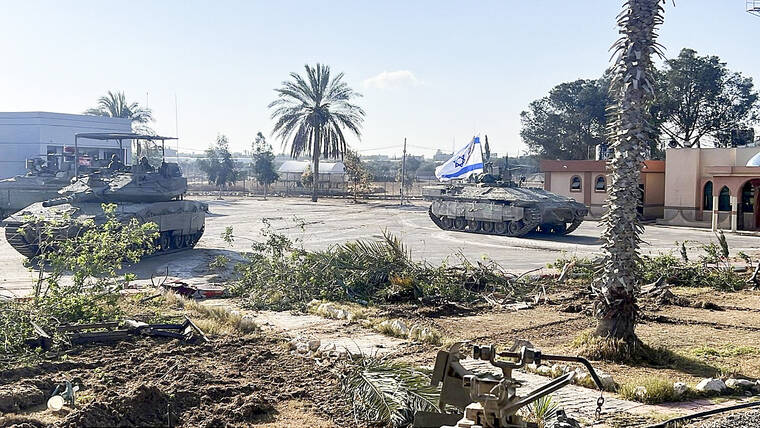Israel says it has taken control of Gaza side of Rafah Crossing amid truce talks
JERUSALEM — The Israeli military said Tuesday that its tanks had entered Rafah in the southern Gaza Strip and had seized control of the city’s critical border crossing with Egypt in what it called a limited operation to eliminate Hamas fighters and infrastructure that had been used to attack and kill four Israeli soldiers Sunday.
The incursion did not appear to be the long-anticipated full-scale invasion of Rafah, a city crowded with about 1 million Palestinians, which Israel’s allies have been working to avert by pushing for a cease-fire deal.
ADVERTISING
International humanitarian officials said the military operation had halted the flow of aid from Egypt into Gaza, exacerbating extreme hunger and privation in the besieged territory.
“The situation is catastrophic in every sense of the word,” said Dr. Suhaib Hems, the head of Kuwait Hospital in Rafah, adding that 27 bodies and 150 wounded people had been brought to his facility since Israeli tanks entered the city.
The Israeli military said it had killed about 20 people in Rafah, describing the dead as Hamas militants.
Hamas said it had fired on Israeli soldiers Tuesday at another vital aid crossing, near Kerem Shalom, along Gaza’s southern border with Israel. The Israeli military said that four mortar shells and two rockets had been launched toward Kerem Shalom from Rafah but that no injuries or damage were reported.
Israel says Rafah is Hamas’ last bastion, home to several battalions hiding out, and a critical gateway for arms shipments smuggled into Gaza from Egypt. But the city has also become a refuge for Palestinians who have fled Israeli bombardment in other parts of Gaza, and many have squeezed into tents without adequate access to food, water and sanitation.
Rafah is also a main entry point for humanitarian aid flowing into Gaza from Egypt. But Israel closed that entry point Tuesday, as well as the Kerem Shalom crossing. Hamas had claimed responsibility for killing four Israeli soldiers in a rocket attack that was fired from Rafah toward Kerem Shalom on Sunday.
The Israeli drive into Rafah came after a dizzying day Monday, when the Israeli military ordered about 110,000 people to evacuate parts of the city; Hamas said it had accepted a revised cease-fire proposal; and Israel said it was carrying out “targeted strikes” in eastern Rafah.
On Tuesday, Prime Minister Benjamin Netanyahu of Israel characterized Hamas’ announcement that it would accept a revised cease-fire deal as a political maneuver “designed to torpedo the entry of our forces into Rafah.”
The text of Hamas’ revised proposal was circulating in the Israeli news media Tuesday and was confirmed as authentic by a senior Hamas official.
The most substantive sticking point centers on a key phrase that appears in both the Israeli- and Hamas-approved proposals: a path to a “sustainable calm.”
In Hamas’ revision, that phrase is clearly defined as a permanent end to the war and a complete withdrawal of Israeli troops from the Gaza Strip. Netanyahu has consistently opposed any deal that explicitly calls for a permanent cease-fire, saying Israeli forces will not stop fighting in Gaza until Hamas is completely destroyed and the hostages are released.
Hamas’ revised proposal, Netanyahu said Tuesday, was “very far from Israel’s core demands.” In his statement, he added that, “military pressure on Hamas is an essential condition to secure the release of our hostages.”
Nevertheless, Netanyahu authorized a midlevel delegation to travel to Cairo on Tuesday to continue indirect talks with Hamas.
William Burns, the CIA director, was in Cairo on Tuesday to attend the talks, which were at a “delicate stage,” John Kirby, the White House national security spokesperson, told reporters in Washington. Kirby said: “There should be no reason why they can’t overcome those remaining gaps.”
Egypt’s foreign ministry Tuesday said that Israel’s seizure of the Rafah crossing was a “dangerous escalation” that threatened the lives of Palestinians sheltering in the city.



